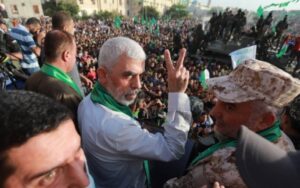
Yahya Sinwar, centre, makes victory gestures, during a rally in the northern Gaza Strip in May 2021
Azzam Tamimi writes in Middle East Eye 18 October 2024
The early pictures posted on social media of Hamas leader Yahya Sinwar lying dead inside what seems to be a partially demolished house in Gaza may not have been what the Israeli leaders wanted the world to see.
It has been suggested that the soldiers who found the dead body and suspected it was of Sinwar hurriedly photographed him and sent the pictures to some acquaintances who in turn posted them for the world to see.
Their superiors had in mind a different narrative as to how the man died.
They would have preferred to draw a picture of a Hamas leader hiding in a tunnel using Israeli hostages as human shields. The truth is that Hamas’ top leader lost his life fighting his enemies.
Not only that.
The pictures show a bullet wound in his head. He was not trying to escape, as Israeli Prime Minister Benjamin Netanyahu would have wanted the world to believe, but rather died in confrontation with the Israeli soldiers standing face to face.
From the Palestinian perspective, this would be considered the most noble and the most honourable of deaths.
Undisputed leader
Yahya Sinwar, or Abu Ibrahim as he is known within Hamas circles, was born in Khan Younis refugee camp in the Gaza Strip in October 1962 to a family of refugees hailing from the Palestinian city of Majdal. In 1948, Zionist gangs occupied the village during the Palestinian Nakba (the creation of the state of Israel) and renamed it Ashkelon.
Like many thousands of residents of areas located to the north of Gaza, which became overnight the “State of Israel”, Sinwar’s family fled southwards for what they thought at the time was going to be a temporary refuge.
All such refugees were convinced that within days they would be back home as soon as troops from neighbouring Arab countries managed, as promised, to come to their aid, securing their towns and villages and deterring Jewish gangs that were perpetrating massacres to drive the Palestinian population out. It was not to be.
Sinwar went to school in Gaza and studied Arabic Literature at the Islamic University. He was an active student at high school and at university where he joined the Muslim Brotherhood’s chapter in Palestine. He was first detained by the Israelis at the age of 20 in 1982 for 10 months and once again in 1985 for eight months.
When Hamas was born in 1987, Sinwar emerged as one of its prominent operatives and was commissioned by the founder of Hamas, Sheikh Ahmad Yassin, with the task of setting up a security apparatus known as Majd. One of the objectives was to detect, pursue and punish collaborators who informed Israeli occupation forces on Palestinian activists within the strip.
Before long, he was eventually arrested in 1988 and sentenced to four life terms for kidnapping and killing two Israeli soldiers and for killing four Palestinians suspected of collaboration with Israel.
He remained in Israeli detention for 23 years, during which he learnt Hebrew and translated or wrote several books. He also played a prominent role in managing the affairs of Hamas detainees and coordinating relations and settling disputes with detainees from other factions.
Hamas is an institutional movement with no personality cult. Leaders who perish are immediately and smoothly replaced
In 2011, he was one of more than a thousand Palestinian detainees released in exchange for one Israeli soldier called Gilad Shalit. Following his emancipation, Sinwar held senior positions within the movement.
Just one year after his release from detention, he was elected in 2012 as a member of Hamas’ political bureau and played a leading role in administering the movement’s military wing, Izziddin Al-Qassam Brigades.
Sinwar gained further prominence in 2021 when he was elected head of the Hamas local organisation in Gaza. This was the year when tensions in Jerusalem over Jewish settlers’ repeated attempts to storm into Al-Aqsa Mosque and Israeli restrictions imposed on Palestinian worshippers, sparked yet another war in Gaza that lasted for 11 days.
This was Israel’s fourth major attack on Gaza in 14 years. There was so much devastation and hundreds of casualties. Yet, the war established Sinwar as the undisputed leader of the enclave.
According to a recent New York Times report citing Hamas documents, which the Israelis allegedly found in a laptop in Gaza, Sinwar and a very close circle of a few of his comrades started preparing for a major offensive against Israel as early as 2021.
Following Israel’s assassination of Ismail Haniyeh in Tehran on 31 July 2024, after lengthy deliberations and much speculation, Hamas’s Shura Council named Sinwar successor to Haniyah as the new political leader of the movement on 5 August.
This was surprising to many observers.
More …

